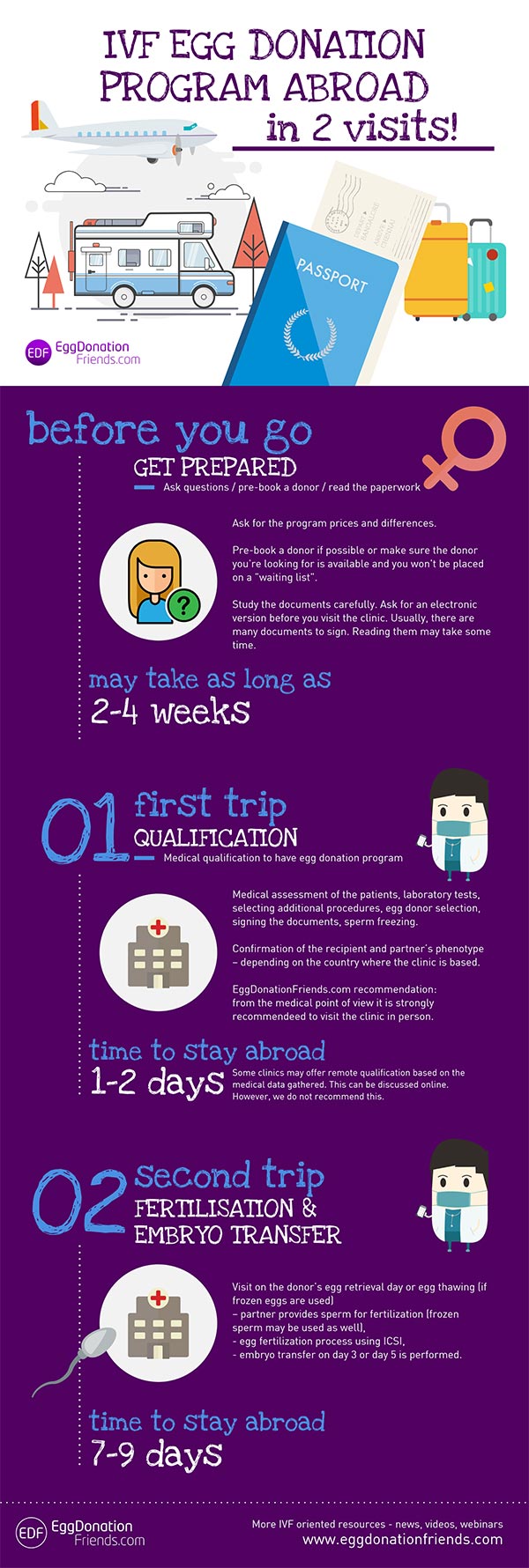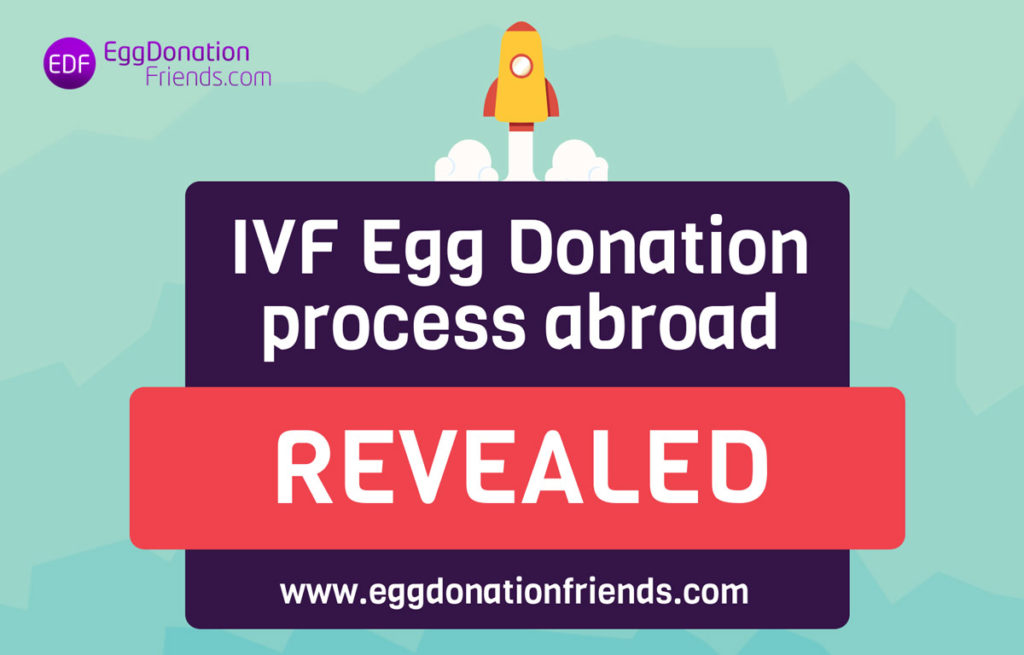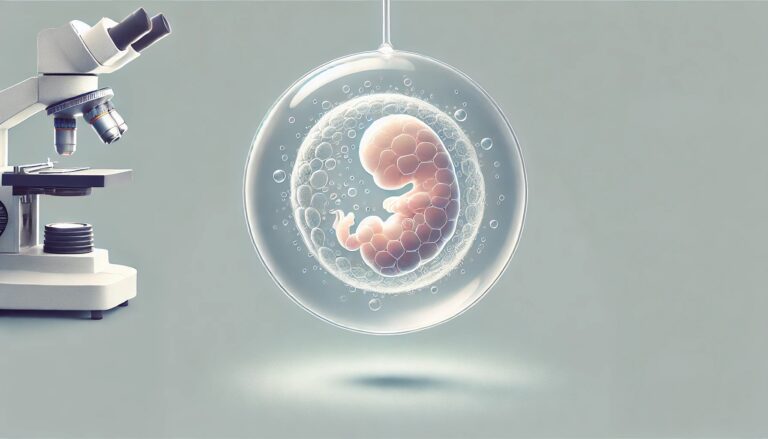Table of Contents
- 1 What is the donor egg IVF process like?
- 2 How does IVF work with donor eggs?
- 3 What is the donor IVF process?
- 4 How does IVF with frozen donor eggs differ from fresh eggs?
- 5 IVF egg donation program – fresh donor eggs
- 6 IVF egg donation program – frozen donor eggs
- 7 Partner’s sperm in egg donation IVF process
- 8 Egg donation process – timeline & milestones
- 9 What are the steps in the IVF process with a donor egg?
- 10 What is the preparation process for IVF with donor eggs?
- 11 How long does the IVF process take with donor eggs?
- 12 Egg donation IVF and the risk of program cancellation
- 13 Donor egg IVF program process – additional procedures at the IVF laboratory
- 14 How many donor eggs are typically needed for IVF?
- 15 How much does the donor egg IVF process cost?
- 16 What are the stages of the donor egg IVF process?
- 17 Will a baby conceived with donor eggs resemble the birth mother?
- 18 How successful is IVF using donor eggs?
Many people who are considering treatment using ART (Assisted Reproduction Technology) and IVF abroad wonder what the IVF egg donation process abroad looks like.
- How does IVF with donor egg process/treatment work?
- How long do you have to stay in the country?
- What is an IVF with a donor egg process timeline?
- What should you pay attention to during the treatment process?
Below you will find some useful information that will help you understand the entire donor IVF process, make well-informed decisions, and save you time and energy. This article focuses on the IVF egg donation process abroad.
What is the donor egg IVF process like?
For many infertility patients in vitro fertilization (IVF) with donated oocytes is the only chance to have children. The largest group of patients using donor eggs are women:
- above the age of 38-40,
- women with poor response to ovarian stimulation,
- low AMH or low-quality oocytes.
Want more insights?
Donor Egg IVF Guide
IVF at 49 with own eggs
How does IVF work with donor eggs?
The process of IVF with donor eggs includes a few stages: a) retrieving eggs from a donor, b) fertilizing eggs with sperm, and c) transferring the embryos to the recipient’s uterus. IVF programs with fresh eggs use gametes right after they are collected, while IVF programs with frozen eggs use donor’s gametes that have been stored before the treatment in the clinic. On average, the treatment takes approximately 4-5 weeks, with a minimum of two appointments in the clinic.
What is the donor IVF process?
IVF with donor egg procedure means that an infertile couple receives oocytes from a donor, then in vitro fertilization with partner’s sperm or donor sperm follows and doctors perform an embryo transfer to the uterus of the recipient. The oocytes come from a young healthy donor, so these types of programs are very successful. The average IVF with donor eggs success rate is 60%. In the case of the groups of patients mentioned above, success rates of IVF with own oocytes might vary by a few to a dozen percent.
Patients can choose between two types of egg donation programmes, depending on the clinic’s offer:
- a fresh egg donation program
- or a frozen egg donation program – usually called “a cycle”.
How does IVF with frozen donor eggs differ from fresh eggs?
IVF with frozen donor eggs is different from fresh donor eggs in timing and availability. Frozen donor eggs are retrieved and frozen ahead of time so they can be used right away without having to wait for a donor to go through ovarian stimulation and retrieval.
In contrast, using fresh donor eggs is a more complex process. Both the donor and recipient have to go through hormonal synchronization to align their cycles, ensuring the eggs can be retrieved and fertilized immediately for transfer into the recipient’s uterus.
IVF egg donation program – fresh donor eggs
What does the fresh IVF egg donation process look like? In a fresh IVF cycle, donor oocytes are not frozen but, immediately after egg retrieval, are transported to the laboratory for in vitro fertilization. The fresh IVF egg donation process requires synchronisation of the recipient and donor cycles. This can be complex and in certain cases may lead to lower success rates.
The egg recipient needs to be prepared for embryo transfer, which takes place about 3-5 days after egg retrieval. It is crucial to prepare the recipient’s uterus and endometrium for embryo transfer and to find the perfect implantation window, a time most appropriate for embryo transfer for the specific patient. The entire egg donation process for IVF needs to be synchronised with the egg donor’s cycle. Unfortunately, the egg retrieval day cannot be moved to a different date and in cases where the preparation for embryo transfer is less than satisfactory, embryo freezing and rescheduling the transfer date can be a solution.
IVF egg donation program – frozen donor eggs
With an IVF cycle using frozen donor eggs, there is no need to synchronise the donor and recipient. The previously selected oocytes are thawed and this can be done on any date within the recipient’s implantation window i.e. preparation of the uterus for embryo transfer, has been established. The only other time limitation is the ab schedule. Hence, frozen egg donation programmes involve less risk regarding programme cancellation or disruption.
Fertility patients often ask if the success rates of frozen egg programs and fresh egg programmes are similar. Read about the effectiveness of egg donor programmes and find out more about the differences between fresh and frozen donor eggs in our webinar: “Fresh donor eggs or frozen eggs for IVF – what’s better?”
Find Top Egg Donation ClinicsPartner’s sperm in egg donation IVF process
Partner’s sperm should be prepared for fertilization on the egg retrieval day from the donor or, in the case of the frozen cycle, on the day of oocytes thawing. This means that the partner needs to come to the clinic at least one day before or on the day of egg retrieval or thawing. This is standard protocol, however, patients should know that should the partner arrive at the last minute, this may increase the risk of disrupting the program. This is because the quality of sperm is unknown on that particular day. Sperm quality can vary over time and may be of lower quality on the day of the qualification appointment at the clinic than previously. Sperm parameters can be affected by various factors, including lifestyle factors such as smoking, alcohol intake or poor diet.
This is why patients should consider freezing sperm during their first visit to the clinic. In this way, your genetic material can be saved for the upcoming treatment and the risk of failure can be minimized if it turns out that the quality of sperm is unsuitable on the day of egg retrieval or thawing. When you have frozen sperm in the bank that had been tested before, you can use it at a later date.
Egg donation process – timeline & milestones
Many patients who choose to have an egg donation treatment abroad want to know how often they have to travel to the clinic and how long they have to stay there.
One of the most frequently asked questions is also: how long does the egg donation process take?
The entire process may take up to 4-5 weeks, however, it is highly individual and depends on a number of factors. You should bear in mind that such treatment involves a great deal of medical, legal and ethical responsibilities, both on behalf of the patient and the clinic. This is why certain stages of the egg donation IVF process needs to be looked at very closely.
Regardless of the number of visits and details of the treatment, every IVF egg donation program process should have the following stages:
What are the steps in the IVF process with a donor egg?
| Stage | Is the visit at the clinic necessary? | Additional information |
|---|---|---|
| Medical qualification to have egg donation program | In most clinics yes. Some clinics offer remote qualification based on the medical data gathered. This can be discussed online. EggDonationFriends.com recommendation: from the medical point of view it is better to visit the clinic in person | In case of online qualification, the clinic may ask you to send over your ultrasound scan report before such a consultation. It is worth visiting the clinic in person. This way you will have a chance to see the clinic, meet the staff and the doctor and make a well-informed decision in selecting this clinic. |
| Selecting an egg donor | To confirm the egg recipient phenotype – depending on the country where the clinic is based. | Depending on the country, there are different regulations regarding the phenotype of the egg donor and recipient. EggDonationFriends.com recommendation: before the patient’s visit at the clinic an egg donor can be pre-booked based on the recipient’s phenotype. |
| Selecting a sperm donor - if applicable | To confirm the recipient and partner’s phenotype – depending on the country where the clinic is based | Depending on the country there are different regulations regarding sperm donor and partner phenotype matching. |
| Choosing an egg donation program | You can check the clinic’s offer online, from the comfort of your home. However, it is recommended that you choose a program in consultation with the doctor at the clinic. | Clinics often offer various programs which differ in the number of guaranteed eggs or/and embryos or other parameters. These guarantees may influence the program’s success rate. |
| Signing documents | In most clinics patients need to sign the agreement in person, often in the presence of a doctor. | Study the documents carefully. Ask for an electronic version before you visit the clinic. Usually, there are many documents to sign. Reading them may take some time. Also, it is worth preparing some questions before your visit. |
| Choosing additional procedures | You can choose additional procedures in the clinic during the consultation with the doctor. Depending on the patient’s medical case, additional procedures may vary. | Selecting the right additional procedures for your medical case may influence the program’s success rates. EggDonationFriends.com recommendation: we recommend having the following procedures: ICSI, blastocyst culture and AH (assisted hatching). |
| Preparing the uterus for embryo transfer | This can be done remotely in cooperation with your local doctor. | This is an important part of the process. With fresh donor eggs, the embryo transfer day cannot be rescheduled, unlike in the case of frozen embryos. |
| Embryo transfer | Embryo transfer is performed in the clinic | Make sure your doctor schedules your embryo transfer on a date when you can rest for a day after the procedure. |
What is the preparation process for IVF with donor eggs?
The preparation process for IVF with donor eggs involves several coordinated steps to get both the donor and recipient ready for fertilization and implantation.
The process starts with medical evaluations, blood tests, ultrasounds and uterine assessment to make sure they are healthy and can carry a pregnancy. The fertility specialist may also recommend psychological counseling to help with the emotional aspect of the process. Once cleared, the recipient starts hormone therapy, estrogen and progesterone to prepare the uterine lining for implantation.
How long does the IVF process take with donor eggs?
Depending on the clinic and the type of program (fresh or frozen eggs), the number of visits and their length can be different in different clinics.
One of the first and most frequently asked questions during the initial contact with the clinic is about the number of visits that the patient is required to make and their duration. Clinics compete with one another in attracting new patients and offer various solutions to minimize the number of visits. Unfortunately for some patients, this may have a negative impact on the attractiveness of the treatment.
In most clinics it is possible to have a donor egg IVF treatment with a minimum of two visits:
- Qualification visit – medical assessment of the patients, laboratory tests, selecting additional procedures, egg donor selection, signing the documents. You will need to stay abroad for one or two days. At this time your partner may also provide his sperm sample and have it frozen.
- Visit on the day of egg retrieval from the donor / or egg thawing if frozen eggs from the bank are used – partner provides sperm, egg fertilization, embryo transfer on day 3 or day 5 is performed. It is usually required that patients stay abroad for about 7 days.
You can also combine these two appointments in one trip and use the free time in between to relax and do some sightseeing.
While it is possible to have an egg donation program with only two visits to the clinic, it is worth bearing in mind that the aim of the treatment is, not to minimize the number of visits but to achieve a pregnancy and sometimes these two things may be mutually exclusive.
Find Top Egg Donation Clinics Abroad
Egg donation IVF and the risk of program cancellation
Any donor egg IVF programme involves some degree of risk that the programme may be cancelled. This may be for reasons beyond the control of the clinic or the doctor, for medical reasons that are hard to anticipate and assess. In other cases, cancellations may be associated with the clinic’s experience in handling such treatment. Nevertheless, every clinic experiences cancellations, with varying frequency. For patients travelling long distances to have their treatment, who need to plan their travel in advance, book flight tickets and accommodation, etc, a cancellation without prior notice, may, unfortunately, mean that they will have to bear extra costs.
In some cases, clinics offer another program at no extra cost or at a discount. Remember to ask the clinic what happens in case your program gets cancelled.
Read more about the donor egg IVF programme cancellation risk: Could my IVF programme with donor eggs be cancelled for some reason?
Below you can find donor egg cycle elements that carry the risk of program cancellation and the average risk of cancellation in fresh and frozen donor egg programs. You can also check when a clinic is able to inform you about problems that may put the program at risk.
Travelling to a different country may pose some risks, too. Your flight may be delayed or cancelled. As a result, you may not arrive at the clinic on time for your embryo transfer. In such a situation you can have your embryos frozen and the transfer rescheduled. However, you may have to bear the additional costs of embryo freezing and FET (frozen embryo transfer). We recommend you ask the clinic if these procedures are included in the programme cost, and, if not, what the costs would be.
| Risk factors | When you will be informed about program cancellation | Estimated risk |
|---|---|---|
| Unsuccessful hormonal stimulation of the egg donor, cancelled egg donor retrieval (fresh cycle) | Minimum 2-3 days/maximum 7-9 days before the scheduled egg retrieval | ~2% of egg donors |
| No eggs to be retrieved (fresh cycle) | One day before or on the day of egg retrieval | ~1% of egg donors |
| Low number or poor quality of retrieved eggs (fresh cycle) | On the day of egg retrieval | ~1% of egg donors |
| Problems with egg thawing, unsatisfactory number of thawed eggs (frozen cycle) | On the day of egg thawing in the IVF lab | ~2-5% of egg donors |
| No embryos available on day 3, poor quality of the partner’s sperm (fresh & frozen cycles) | Day 2 or day 3 of embryo culture | Depending on partner’s sperm parameters |
| No embryos available on day 5 (fresh & frozen cycles) | Day 4-5 of embryo culture | Depending on partner’s sperm parameters |
| Endometrium is not ready for the scheduled embryo transfer (fresh & frozen cycles) | On the day of transfer or earlier if the patient is prepared remotely for the transfer in their home | ~4-6% of patients |
Learn more about Cost of IVF with donor eggs
Donor egg IVF program process – additional procedures at the IVF laboratory
Egg donation programmes offered by clinics often do not include any additional procedures, performed in the IVF laboratory, which can boost the efficacy of the IVF treatment. Patients need to pay extra if they want to have additional treatment procedures not included in the program cost. Below you can find some of the most common IVF Laboratory procedures which can boost IVF success rates.
| IVF LAB Procedure | For whom? | EDF recommendation |
|---|---|---|
| ICSI | Recommended to all patients (in some countries the indication is a male infertility factor) | Yes |
| IMSI/IMSI-MSOME or other similar procedures | Recommended if a male infertility factor is involved. The embryologist assesses the sperm under the microscope and selects a single sperm. | Yes *if a male infertility factor is involved |
| Blastocyst culture | Recommended to all patients. Embryo culture up to blastocyst stage - day 5. | Yes. In case of a program with day 3 embryo guarantee, this guarantee may be void if the blastocyst culture is extended to day 5. |
| Choosing an egg donation program | You can check the clinic’s offer online, from the comfort of your home. However, it is recommended that you choose a program in consultation with the doctor at the clinic. | Clinics often offer various programs which differ in the number of guaranteed eggs or/and embryos or other parameters. These guarantees may influence the program’s success rate. |
| Embryo monitoring (Time Lapse/Embryoscope) | Recommended to all patients even though there are no research papers showing its impact on treatment effectiveness. However, embryo development video or photos can be a nice keepsake for parents-to-be. | No *unless the patient wishes to keep the video |
| Choosing additional procedures | You can choose additional procedures in the clinic during the consultation with the doctor. Depending on the patient’s medical case, additional procedures may vary. | Selecting the right additional procedures for your medical case may influence the program’s success rates. EggDonationFriends.com recommendation: we recommend having the following procedures: ICSI, blastocyst culture and AH (assisted hatching). |
| AH - assisted hatching | Recommended to all patients. Assisted hatching is a procedure where an embryologist performs a microscopic cut in the embryo shell. | Yes *In the past this procedure was performed only on thawed embryos. Nowadays it is also done on fresh embryos before transfer. It is believed that AH can increase implantation success rate by about 10% average. |
| Preimplantation genetic diagnostics – embryo diagnostics (aneuploidy in chromosomes) | Recommended to all patients over the age of 35. This examines embryos in order to detect chromosomal aneuploidy. Modern techniques such as NGS allow the examination of all 24 chromosomes. Aneuploidy may cause genetic diseases like Down, Patau syndrome. May also affect implantation rate and miscarriages. | Yes *Patients should have medical indication for such diagnostics. The risk of aneuploidy with IVF with donor oocytes is much lower than in IVF with own eggs. Donor eggs come from a young and healthy donor, so that the risk of aneuploidy equals population risk in the donor’s age group. Another factor that may increase risk is partner’s age and the quality of sperm. The patient’s concerns or fears of having an ill baby may also be an indication to have PGD. They may cause additional stress. |
| Patient monitoring after embryo transfer - implantation supervision | Recommended up to at least 4-6 week of pregnancy. At least 4-5 verifications. The doctor can then adjust drug dosage after embryo transfer. If you cannot continue this part of treatment with the clinic abroad, we recommend you find a local fertility clinic and have the necessary tests and consultations with a specialist near you. Such follow-ups can boost your chances of a successful pregnancy. | Yes *The basic tests e.g. BhCG, LH, Progesterone and Estradiol may be required. You should receive the test results on the same day and send them over to the clinic. In some countries, patients may experience difficulties having some lab tests done because of the national health system. |
If you are in the process of selecting a clinic, if you have questions or doubts about a clinic’s offer, or if you are not sure what to ask the clinic, contact us via live chat, e-mail or phone. Our services are free of charge. We will be happy to answer your questions and offer advice.
Read more about:
7 questions to ask fertility clinics before egg donation treatment
Best fertility clinics in the world

Remember, before you go ask important questions first. The IVF Clinic should answer all of them. Make sure you have all the answers before you decide.
How many donor eggs are typically needed for IVF?
The number of eggs needed for IVF can vary depending on several factors, including the age of the donor and the specific goals of the recipient. On average, clinics report that around 8 to 12 eggs are typically retrieved per donor cycle. Many clinics aim to retrieve enough eggs to increase the chances of getting viable embryos for transfer, as not all eggs will fertilise or develop properly.
The exact number of eggs needed will also depend on the individual’s circumstances and fertility goals.
How much does the donor egg IVF process cost?
In the United States, the cost of IVF using donor eggs can be quite high, ranging from $20,000 to $60,000 depending on several factors such as the type of donor eggs used (fresh or frozen), the clinic’s location, and additional services required.
Many European countries offer competitive pricing for fertility treatments, often with all inclusive packages that cover multiple procedures and medications at a fraction of the cost in the US.For example some clinics in Spain or the Czech Republic offer IVF with donor eggs for as little as €5,000 to €10,000 (approximately $5,500 to $11,000).
What are the stages of the donor egg IVF process?
The donor egg IVF process has several stages to achieve successful fertilization and implantation.
First is the selection of the donor, which includes reviewing donor profiles, medical history and genetic testing to ensure compatibility. Once a donor is chosen, the recipient undergoes medical evaluations to assess their overall health and uterine readiness. The next stage involves fertilization, where the retrieved eggs are combined with sperm in a lab to create embryos.
Will a baby conceived with donor eggs resemble the birth mother?
A baby born from donor eggs will not share any genetic material with the birth mother, as the child inherits half of its DNA from the egg donor and half from the sperm provider. This means that, in strict genetic terms, the child is biologically related to the egg donor, not the birth mother.
However this doesn’t rule out physical resemblance.The selection process for egg donors often involves matching phenotypic traits like hair color, eye color and other physical characteristics that match the intended mother. But, even if the donor looks nothing like the recipient, there is still a chance the baby may look like the birth mother.
How successful is IVF using donor eggs?
IVF using donor eggs is generally very successful, with success rates often higher than traditional IVF. Donor eggs come from young healthy women with proven fertility which increases the chances of creating viable embryos. This high success rate makes donor egg IVF a great option for people or couples who are struggling with infertility due to age, poor egg quality or genetic concerns.
Factors that affect these success rates are the age and health of the egg donor, as younger donors tend to provide higher-quality eggs with fewer chromosomal abnormalities. While many clinics have impressive statistics, individual outcomes can vary based on personal health conditions and clinic practices.
Related reading
- IVF with Donor Eggs Abroad – 9 Most Popular Destinations
- IVF success rates – myths and figures revealed
The article was updated in September 2024






As I am Swedish and 48 years I am not allowed to be given the opportunity of donor egg and donor sperm, alternative a surplus embryo from couple. How do I approach a nurse/gybecologist in my country for help with medicin and monitoring before and after fertilised egg is received?
I need an appointment As soon as possible
From my personal experience the time of ivf egg donation treatment depend on personal needs and medical history. We had 3 on-line consultations about ivf process and organization of the treatment with clinics in spain and cyprus. One of them was free of charge (spain). There are a lot of paperwork we had to sign and most of them must be signed off at clinic. Anyway we spent 1 week in spain plus 2 on-line pre-consultations so it wasn’t long process. It took us about 1 month. The only thing you all should be aware – the phenotype matching in spain is regulated by law – so the clinic has to find the donor mathing yourself – sometimes it may take some time. In our case it took about 2 weeks.
Hi Zineb,
do you have any preferences as for destination and type of treatment? We will e-mail you with a few suggestions.
Very good article showing what the ivf process step by step. Obviously it’s just a guide/hint how your ivf treatment with donor eggs may look like. I really like the risk factors and additional ivf lab procedures tables, they’re very informative – and honestly I wasn’t aware of the risks of program cancellation at all. It’s definitely worth asking the clinics how it works before you go there…
I’ve had 3 fresh egg cycles and all failed. I think the first cycle failed because the doctor did the transfer in spite of thefact that my lining was too thin. and we were never offered any additional procedures.after reading this article I think I would choose frozen cycle.with frozne eggs you can have the trsnfer when you’re ready
My whole ivf procedure took exactly 6 weeks. It was my fourth one and it was a success! <3 sometimes clinics tell you sth cannot be done, dont listen to them, first read articles like this and get information before you speak to the doctor. thats what I did and this made me more confident in the process
thank you! finally ivf egg donation process explained in simple words. Me and my wife are planning to have ivf abroad in Sept. we’re preparing now. very useful info
Other countries might not have the same limits, so if you use donated sperm, eggs or embryos from abroad your child may be genetically related to many more children.
Just about every person who starts an IVF cycle knows that pregnancy and a live birth are not guaranteed. But many are surprised if they don’t make it to the embryo transfer. Here are some possible reasons your IVF cycle may be delayed, canceled, or fail to reach the embryo transfer.